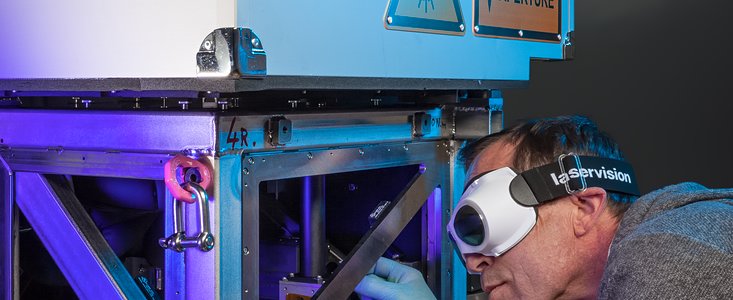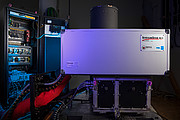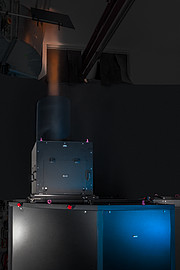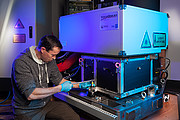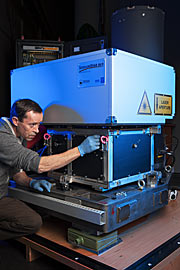Anuncio
Unidades del sistema Estrella Guía Láser se aprueban y envían a Chile
El Sistema de 4 Estrellas Guía Láser alcanza hito clave
27 de Noviembre de 2015
Las cuatro unidades que conforman el Sistema de 4 Estrellas Guía Láser, componente esencial del Sistema de Óptica Adaptativa (AOF, por sus siglas en inglés) del Very Large Telescope de ESO, han sido aprobadas y están siendo enviadas a Chile. Este es un importante paso para hacer de la Unidad de Telescopio 4 del VLT un telescopio completamente equipado con óptica adaptativa, capaz de entregar una calidad de imagen mucho mayor.
Un sistema de óptica adaptativa emplea sensores para analizar la turbulencia atmosférica, además de un espejo deformable integrado al telescopio para corregir las distorsiones producidas por la atmósfera en las imágenes. Sin embargo, es esencial que un punto brillante, semejante a una estrella, esté muy cerca del objeto a ser estudiado para lograr medir de manera precisa la turbulencia existente.
Encontrar una estrella real en el lugar adecuado para que cumpla esta función es muy poco probable. Por lo que para lograr corregir la turbulencia atmosférica en cualquier área del cielo y para todo posible objeto de estudio, se requiere una estrella artificial. Tales estrellas pueden crearse proyectando un potente rayo láser al cielo a la capa de sodio de la atmósfera, donde genera un resplandor intenso que se asemeja, desde el suelo, al de una estrella.
Al medir los movimientos y distorsiones de esta estrella artificial inducidos por la atmósfera, y al hacer pequeños ajustes al espejo secundario deformable a una velocidad de mil veces por segundo, el telescopio puede producir imágenes con una nitidez muy superior a la obtenida sin el uso de óptica adaptativa.
La primera unidad de estrella guía láser del Sistema de Óptica Adaptativa fue instalada en el VLT y probada in situ de manera exitosa a principios de este año. Estas pruebas han confirmado el sólido diseño implementado por ESO, en colaboración con la industria y los institutos científicos europeos [1]. Las pruebas de la Unidad de Telescopio 4 del VLT, llevadas a cabo en Chile, mostraron una alta calidad óptica, proporcionando una imagen de estrella artificial prácticamente perfecta, y una alta eficiencia en la excitación de la capa de sodio. El éxito obtenido permite que el equipo pueda proceder a realizar pruebas preliminares con GRAAL, el módulo de óptica adaptativa que alimenta a HAWK-I, el sistema de procesamiento de imágenes de campo amplio de la Unidad de Telescopio 4; siendo todos estos, avances hacia la puesta en marcha definitiva del Sistema de Óptica Adaptativa emplazado en Paranal.
El Sistema de Óptica Adaptativa empleará cuatro láseres de forma simultánea, lo que permitirá caracterizar las propiedades de la atmósfera (y por lo tanto un mayor campo de visión en el que se corrige la imagen) mucho mejor de lo que es posible con un solo láser.
Cuando se complete la instalación, el Sistema de Óptica Adaptativa suministrará la luz a dos instrumentos, HAWK-I (en conjunto con GRAAL) y el espectrógrafo de campo integral, MUSE, (en conjunto con GALACSI).
Notas
[1] Las empresas que participaron incluyen a: TOPTICA, Alemania; TNO, Países Bajos; MPB Communications, Canadá; Optec, Italia; Astrel, Italia; y Laseroptik, Alemania. Además el Observatorio Astronómico de Roma, INAF, Italia, realizó grandes contribuciones al proyecto.
Enlaces
- Información adicional acerca del láser
- Información adicional acerca del espejo secundario deformable
- Información adicional acerca del telescopio emisor del láser
Contactos
Domenico Bonaccini Calia
ESOGarching bei München, Alemania
Tel: +49 89 3200 6567
Correo electrónico: dbonacci@eso.org
Wolfgang Hackenberg
ESO
Garching bei München, Alemania
Tel: +49 89 3200 6782
Correo electrónico: whackenb@eso.org
Richard Hook
Encargado de Prensa de ESO
Garching bei München, Alemania
Tel: +49 89 3200 6655
Cel: +49 151 1537 3591
Correo electrónico: rhook@eso.org
Sobre el anuncio
| Identificador: | ann15089 |
Our use of Cookies
We use cookies that are essential for accessing our websites and using our services. We also use cookies to analyse, measure and improve our websites’ performance, to enable content sharing via social media and to display media content hosted on third-party platforms.
ESO Cookies Policy
The European Organisation for Astronomical Research in the Southern Hemisphere (ESO) is the pre-eminent intergovernmental science and technology organisation in astronomy. It carries out an ambitious programme focused on the design, construction and operation of powerful ground-based observing facilities for astronomy.
This Cookies Policy is intended to provide clarity by outlining the cookies used on the ESO public websites, their functions, the options you have for controlling them, and the ways you can contact us for additional details.
What are cookies?
Cookies are small pieces of data stored on your device by websites you visit. They serve various purposes, such as remembering login credentials and preferences and enhance your browsing experience.
Categories of cookies we use
Essential cookies (always active): These cookies are strictly necessary for the proper functioning of our website. Without these cookies, the website cannot operate correctly, and certain services, such as logging in or accessing secure areas, may not be available; because they are essential for the website’s operation, they cannot be disabled.
Functional Cookies: These cookies enhance your browsing experience by enabling additional features and personalization, such as remembering your preferences and settings. While not strictly necessary for the website to function, they improve usability and convenience; these cookies are only placed if you provide your consent.
Analytics cookies: These cookies collect information about how visitors interact with our website, such as which pages are visited most often and how users navigate the site. This data helps us improve website performance, optimize content, and enhance the user experience; these cookies are only placed if you provide your consent. We use the following analytics cookies.
Matomo Cookies:
This website uses Matomo (formerly Piwik), an open source software which enables the statistical analysis of website visits. Matomo uses cookies (text files) which are saved on your computer and which allow us to analyze how you use our website. The website user information generated by the cookies will only be saved on the servers of our IT Department. We use this information to analyze www.eso.org visits and to prepare reports on website activities. These data will not be disclosed to third parties.
On behalf of ESO, Matomo will use this information for the purpose of evaluating your use of the website, compiling reports on website activity and providing other services relating to website activity and internet usage.
Matomo cookies settings:
Additional Third-party cookies on ESO websites: some of our pages display content from external providers, e.g. YouTube.
Such third-party services are outside of ESO control and may, at any time, change their terms of service, use of cookies, etc.
YouTube: Some videos on the ESO website are embedded from ESO’s official YouTube channel. We have enabled YouTube’s privacy-enhanced mode, meaning that no cookies are set unless the user actively clicks on the video to play it. Additionally, in this mode, YouTube does not store any personally identifiable cookie data for embedded video playbacks. For more details, please refer to YouTube’s embedding videos information page.
Cookies can also be classified based on the following elements.
Regarding the domain, there are:
- First-party cookies, set by the website you are currently visiting. They are stored by the same domain that you are browsing and are used to enhance your experience on that site;
- Third-party cookies, set by a domain other than the one you are currently visiting.
As for their duration, cookies can be:
- Browser-session cookies, which are deleted when the user closes the browser;
- Stored cookies, which stay on the user's device for a predetermined period of time.
How to manage cookies
Cookie settings: You can modify your cookie choices for the ESO webpages at any time by clicking on the link Cookie settings at the bottom of any page.
In your browser: If you wish to delete cookies or instruct your browser to delete or block cookies by default, please visit the help pages of your browser:
Please be aware that if you delete or decline cookies, certain functionalities of our website may be not be available and your browsing experience may be affected.
You can set most browsers to prevent any cookies being placed on your device, but you may then have to manually adjust some preferences every time you visit a site/page. And some services and functionalities may not work properly at all (e.g. profile logging-in, shop check out).
Updates to the ESO Cookies Policy
The ESO Cookies Policy may be subject to future updates, which will be made available on this page.
Additional information
For any queries related to cookies, please contact: pdprATesoDOTorg.
As ESO public webpages are managed by our Department of Communication, your questions will be dealt with the support of the said Department.
